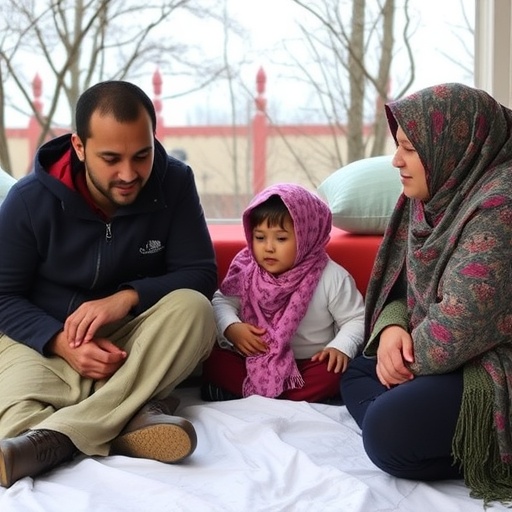In a notable study highlighting the challenges encountered by Afghan refugees in Canada, researchers shed light on the health status and healthcare utilization patterns among this population during the period spanning from 2011 to 2020. Resettled in Calgary, these refugees represent a unique cross-section of individuals faced with considerable hardships, having fled conflict and instability in their home country. The findings underscore not only the pressing health needs of this demographic but also the importance of tailored healthcare services to meet those needs adequately.
The study, authored by Smati et al., utilized a mixed-methods approach, combining quantitative data from health surveys with qualitative insights gained through interviews with refugees. This comprehensive methodology allowed the researchers to gather a nuanced understanding of the healthcare experiences of Afghan refugees in Calgary. It is paramount to acknowledge the profound psychological and physical toll that displacement can inflict on individuals, compelling the need for a targeted response from healthcare systems worldwide.
One striking aspect of the findings relates to the mental health concerns prevalent among Afghan refugees. Many participants reported experiencing symptoms of depression, anxiety, and post-traumatic stress disorder. These mental health issues invariably impact their overall health and well-being, influencing their interactions with healthcare services. The stigma associated with mental health in many cultures can hinder individuals from seeking help, complicating their resettlement experience in a new land.
Access to healthcare proved to be another significant challenge for Afghan refugees. Despite living in a city as developed as Calgary, many faced barriers to accessing essential medical services. Language differences, lack of familiarity with the healthcare system, and financial constraints were frequently cited as obstacles. These factors often resulted in delayed diagnoses and treatments, exacerbating existing health conditions and contributing to a cycle of poor health outcomes.
Moreover, the study highlighted the role of community organizations and support systems in aiding Afghan refugees with their healthcare needs. Many participants reported positive experiences when they received support from local non-profits or community groups that understood their specific cultural and linguistic needs. This finding points to the critical importance of building culturally competent healthcare frameworks that emphasize community engagement and support.
Another significant observation from the research was the varied use of preventive healthcare services among Afghan refugees. Many individuals showed a reluctance to participate in routine screenings or preventive measures, often due to a lack of understanding of their importance. This underutilization of preventive care highlights an urgent need for educational initiatives aimed at informing refugee populations about the significance of regular health check-ups and health promotion activities.
Additionally, the study examined the demographic variables of the participants, including age, gender, and socioeconomic status, and how these factors influenced healthcare utilization. Women, particularly, faced unique challenges, as they often prioritize the health of their families over their own needs. This finding points to the need for gender-sensitive healthcare practices that recognize the differing health dynamics within families and offer equitable access to services.
While the research presents a bleak portrayal of health status among Afghan refugees in Calgary, it also emphasizes the resilience of this community. Many individuals demonstrated a strong desire to improve their health outcomes and integrate into Canadian society despite the myriad challenges they faced. This determination signifies the potential for effective healthcare interventions that harness the strengths and capabilities of refugee populations to foster better health outcomes.
Simultaneously, the study calls for policymakers to recognize the significance of understanding the unique healthcare needs of resettled populations. Creating policies that are inclusive and responsive to the needs of refugees is crucial, not only for improving individual health outcomes but also for promoting public health at large. An investment in targeted healthcare initiatives can lead to more effective health systems that support the full integration of refugees into Canadian society.
Ultimately, the findings of this research serve as a clarion call for improved healthcare interventions and support mechanisms aimed at refugees. Health services must not only be accessible but also equitable and culturally sensitive. By addressing the unique needs of Afghan refugees, healthcare providers can foster an environment conducive to healing and well-being, allowing individuals to thrive in their new homes.
The impact of this study extends beyond Calgary, as it presents relevant considerations for other cities and countries welcoming refugees. Understanding the intricacies of health care utilization among displaced populations can guide global efforts to bolster health systems and provide necessary support. It lays the groundwork for further research into the diverse experiences of refugees and the ways in which health systems can evolve to meet the challenges posed by a growing global refugee crisis.
In conclusion, Smati et al.’s research on the health status and healthcare utilization of Afghan refugees in Calgary serves as an essential contribution to the existing literature on refugee health. It encapsulates the myriad challenges faced by individuals who have fled their homelands, emphasizing the need for responsive healthcare systems that can address their unique needs. The insights garnered from this study not only inform policymakers and health practitioners but also underscore the resilience and potential inherent within refugee populations.
Subject of Research: Health status and care utilization among Afghan refugees recently resettled in Calgary, Canada between 2011–2020.
Article Title: Health status and care utilization among Afghan refugees recently resettled in Calgary, Canada between 2011–2020.
Article References: Smati, H., Hassan, N., Essar, M.Y. et al. Health status and care utilization among Afghan refugees recently resettled in Calgary, Canada between 2011–2020. BMC Health Serv Res 25, 1373 (2025). https://doi.org/10.1186/s12913-025-13544-5
Image Credits: AI Generated
DOI:
Keywords: Refugee health, Afghanistan, healthcare access, mental health, resettlement, community support, preventive care, cultural competency.
Tags: addressing mental health among refugeesAfghan refugees health trendsCalgary refugee healthcare experienceshealth status of Afghan immigrantshealth surveys Afghan refugeeshealthcare utilization in Calgarymental health challenges refugeesmixed-methods study in refugee populationspost-traumatic stress disorder in refugeespsychological impact of displacementqualitative research in refugee healthtailored healthcare services for refugees





